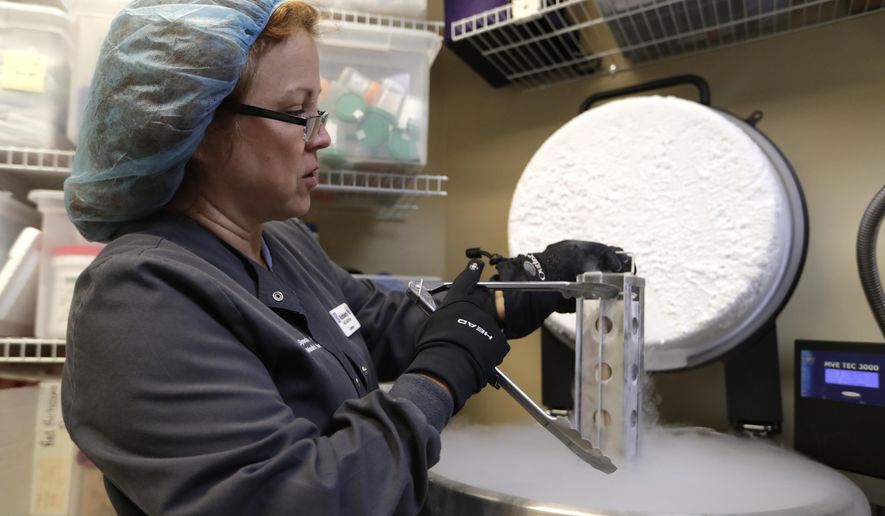Mandy Rooks has asked the Supreme Court to award her custody of the frozen embryos she and her ex-husband created years before they separated, saying she deserves the right to have another child from her ex-husband, even if they’re no longer together.
Drake Rooks says the six embryos should be destroyed because they were the product of a union that no longer exists and he has no interest in having more children with his ex-wife.
The case has stirred the passions of pro-life advocates who argue the embryos are “persons” to be protected, not “marital property” to be fought over, as the Colorado Supreme Court ruled.
The state justices sent the case back to a lower court for more consideration, but Ms. Rooks has asked the federal high court to cut to the chase, take the case and carve out a new legal standard.
The issues are complicated and thorny, and Shirley Howell, a professor at Faulkner University and author of “The Frozen Embryo: Scholarly Theories, Case Law, and Proposed State Regulation,” said it would be unusual for the justices to grant a hearing.
She said the principles appear to be on the ex-husband’s side.
“The general consensus among the various cases is that there is both a right to procreate and there is also a constitutional right not to procreate, and they tend to award the frozen embryos to the person who no longer wants to procreate,” Ms. Howell said.
The Rooks married in 2002 and officially divorced in 2015. They have three children who were born from in vitro fertilization.
They appear to have anticipated a rocky future in the agreement they had with their fertility clinic: If Mr. Rooks were to die, Ms. Rooks would have custody of the embryos. But if Ms. Rooks were to die, the embryos would be thawed and discarded.
In case of a divorce, they agreed to give courts the final decision over the embryos’s fate.
The lower court that first heard the case weighed a number of factors, including the fact that Ms. Rooks already had three children who fulfilled her wish of becoming a mother. The judge also noted she has no income and one of her children suffers from a significant medical condition.
Ultimately, the trial court found Mr. Rooks’s desire not to become a parent outweighed Ms. Rooks’s wishes to preserve the embryos.
As the case has risen through the courts, Ms. Rooks became pregnant and gave birth to another child.
James Giese, an attorney for Mr. Rooks, said that child was not born through IVF.
Mr. Giese also said the persons versus property argument Ms. Rooks now is making was not raised at the Colorado Supreme Court.
Ms. Howell said she doubts the Supreme Court will take the case, saying it appears to be an “end run” around Roe v. Wade, the landmark 1973 decision that established a right to abortion.
“A woman, who has a growing embryo in her womb, has the constitutional right to abort it up to viability and quite possibly beyond — that’s settled law. They are trying to get the court to confer a constitutional right to a frozen embryo,” Ms. Howell said.
But Rita Gitchell, an attorney for the Thomas More Society, which filed a brief in support of Ms. Rooks, said treating the embryos like property is “not unlike the treatment of African slaves in the pre-abolition era.”
“Mr. and Ms. Rooks are forever genetic parents of these created embryos. A court can terminate his or her legal parental rights, but can never terminate the genetic fact that these tiny embryos are their biological children,” Ms. Gitchell said.
Disputes like the one between the former couple are common enough that some engaged couples write exact stipulations into prenuptial agreements.
• Alex Swoyer can be reached at aswoyer@washingtontimes.com.




Please read our comment policy before commenting.